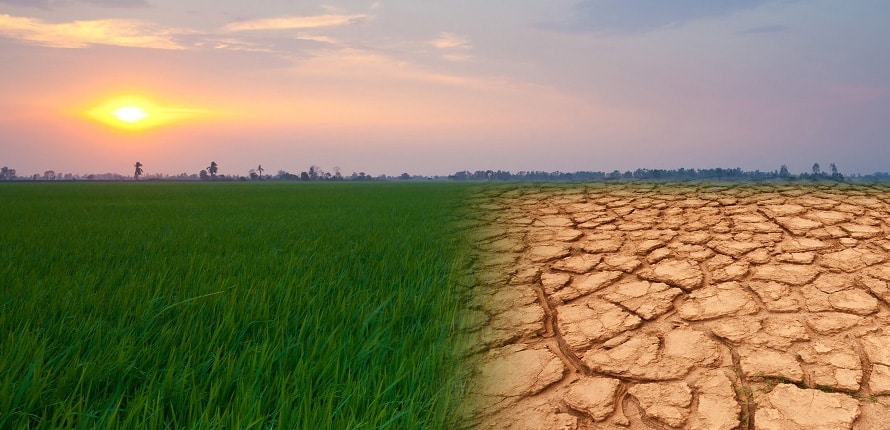Dr. Ousmane Badiane, Director for Africa at the International Food Policy Research Institute
The mission of the International Food Policy Research Institute (IFPRI) is to provide research-based policy solutions that sustainably reduce poverty and end hunger and malnutrition. One of the major challenges confronting present and future efforts to achieve food security is climate change, which is already affecting agriculture and food systems worldwide and particularly in vulnerable areas. IFPRI seeks to identify actions and policies that can help to ensure resilience and increase food security in the context of the changing climate and increasing constraints on agricultural production. One of our strategies is to build the evidence base around climate-smart agriculture (CSA), an approach that seeks to combine increases in production with better adaptation to the effects of climate change as well as reductions in greenhouse gas emissions.
IFPRI’s Africa Regional Offices facilitate the Regional Strategic Analysis and Knowledge Support System (ReSAKSS), which provides evidence and capacity strengthening and facilitates mutual accountability processes in support of Africa’s agricultural development initiatives. ReSAKSS publishes an Annual Trends and Outlook Report (ATOR) reporting African agricultural development indicators and examining topics of importance to African agriculture. The most recent ATOR, published in October 2017,[i] reviews the current state of knowledge on the effects of climate change on African agriculture and food security and the potential for climate-smart agriculture to counteract the negative effects of climate change.
Chapter 2 of the report[ii] uses the International Model for Policy Analysis of Agriculture Commodities and Trade (IMPACT) developed by IFPRI’s Environment and Production Technology Division to analyze likely future production, trade, and hunger outcomes and the impacts of climate change. The authors predict that production of cereals and other crops in Africa will be between 7 and 13 percent lower by 2050 than in the absence of climate change. The number of people at risk of hunger is projected to decline by 9 percent in Africa by 2050, a disappointingly small reduction compared to the estimated reduction in the absence of climate change of 27 percent. However, research suggests that the adoption of technologies including heat- and drought-tolerant crop varieties, nitrogen-use-efficient varieties, and no-till farming could counteract the effects of climate change on crop yields.
Farmers’ ability to adopt new varieties and technologies is limited by barriers including lack of access to information and finance. Investments in research and technology and in market infrastructure are necessary to facilitate the adoption of climate-smart technologies. IFPRI simulations through 2030 suggest that comprehensive investments in agricultural research and development, water resource management, and infrastructure have the potential to more than offset the effects of climate change on crop yields in Africa.
Chapter 3 of the ATOR[iii] takes an in-depth look at the likely impacts of widespread adoption of climate-smart agriculture practices on African agriculture. The authors find that using CSA practices in wheat, maize and rice cultivation has great potential to counteract the negative effects of climate change on crop yields in Africa south of the Sahara, and can help to improve soil fertility. However, there appear to be trade-offs between the goals of increasing crop yields and reducing greenhouse gas emissions associated with agriculture. It is possible for CSA practices to both improve yields and reduce emissions, but efforts to incentivize emissions reductions are likely to be needed to ensure that the multiple goals of CSA are met.
Other chapters of the ATOR examine the impacts of particular CSA practices and tools, discuss factors affecting the adoption of CSA, and explore policy frameworks linking CSA with other development issues. Other IFPRI projects to better inform the struggle for food security in the context of climate change include the ReSAKSS country eAtlases, which provide an online tool to visualize detailed subnational data on agricultural, climatic, and socioeconomic indicators for African countries, and the Gender, Climate Change, and Nutrition Integration Initiative, which identifies linkages between gender, climate and nutrition to increase the effectiveness of strategies in each area.
Policymakers working to improve food security in their countries face enormous challenges and uncertainties presented by the changing climate. IFPRI will continue to work on many fronts to provide the evidence policymakers need to design effective strategies to adapt to and mitigate the effects of climate change. By harnessing the best knowledge and evidence, we can continue and even accelerate progress toward an end to hunger, despite the threat of climate change.
[i] De Pinto, A., and J. M. Ulimwengu (Eds). 2017. A Thriving Agricultural Sector in a Changing Climate: Meeting Malabo Declaration Goals through Climate-Smart Agriculture. ReSAKSS Annual Trends and Outlook Report 2016. Washington, DC: International Food Policy Research Institute.
[iii] De Pinto, A., H. Y. Kwon, N. Cenacchi, and S. Dunston. 2017. “The Effects of Widespread Adoption of Climate-Smart Agriculture in Africa South of the Sahara under Changing Climate Regimes.” In A Thriving Agricultural Sector in a Changing Climate: Meeting Malabo Declaration Goals through Climate-Smart Agriculture, ReSAKSS Annual Trends and Outlook Report 2016, edited by A. De Pinto and J. M. Ulimwengu, 22–39.
